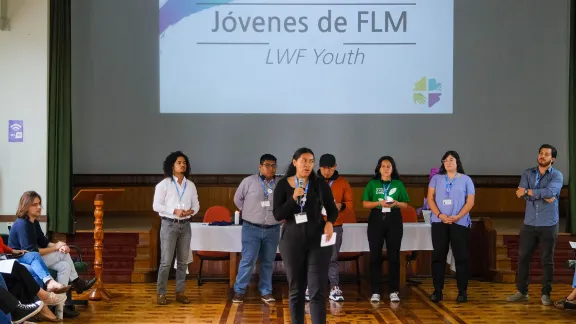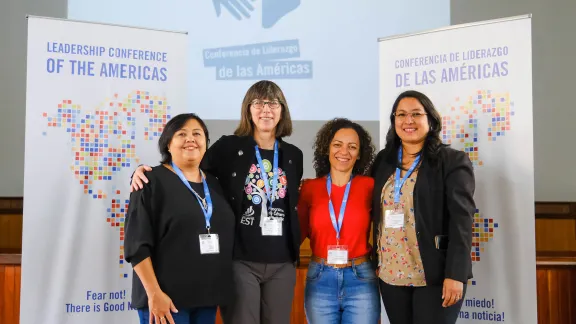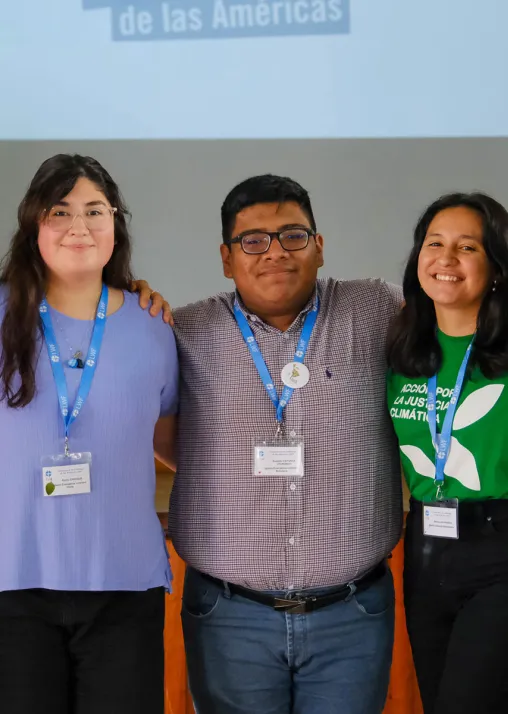During the Leadership Conference of the Americas, the regions’ women’s and youth networks presented their work priorities for the coming years.

Youth participants of the Leadership Conference of the Americas presenting their work priorities during the meeting. Photo: LWF/Gabriela Giese
Being an inclusive church
(LWI) - The women’s and youth networks of the Americas will initiate several actions based on their messages to last year’s regional Pre-Assembly, the global Pre-Assemblies, and resolutions of The Lutheran World Federation’s (LWF) Thirteenth Assembly in Krakow, Poland.
The networks of Latin America and the Caribbean, and North America met on 14 April before the Leadership Consultation (COL) in São Leopoldo, Brazil. During COL, they presented the outcomes of their respective meetings and introduced the regional network coordinators.
Priorities of the women’s networks of the Americas
One priority of the women’s networks is to strengthen communication and networking among women from LWF member churches in the region. That requires contact persons in all churches.

The coordinators of the women’s networks in the Americas are (from left) Georgina Arriagada Adriazola (Evangelical Lutheran Church in Chile - ILCH), Mary Streufert (Evangelical Lutheran Church in America - ELCA), Carmen Michel (Evangelical Church of the Lutheran Confession in Brazil - IECLB), and Adriana Alvaro (Salvadoran Lutheran Church - ILS). Photo: LWF/Gabriela Giese
Education and formation emphasizing gender justice will continue. One expression of this will be developing liturgies for particular days, such as the International Day for the Elimination of Violence Against Women on 25 November, International Women’s Day on 8 March, and Reformation Day on 31 October.
Based on our biblical and theological calling, training women and men to prevent and eliminate gender-based violence is planned to take place in the form of an online course. This course aims to train women and men leaders of LWF member churches on prevention and creating support groups for women in situations of violence in their communities.
“Church leaders should not be afraid to encourage men, women and youth to build their capacities to speak up against and prevent gender-based violence,” said Rev. Sílvia Genz, Pastor President of the Evangelical Church of the Lutheran Confession in Brazil (IECLB) in her response to this goal. “It will strengthen our churches and their credibility.”
In view of the 500th anniversary of the Augsburg Confession in 2030, women’s networks are planning monthly online discussion groups for women on the confessional document to strengthen their response to misleading theologies in their contexts.
Also linked to the Augsburg Confession and the upcoming anniversary, the networks recommend that LWF member churches consider the impact of women and gender justice theologians who have challenged, supported, and embodied the document. Such an approach will encourage inclusivity, one of the communion’s values in their planning processes for celebrations, commemorations, publications, and media.
Priorities of the youth networks of the Americas
The regional youth networks will advocate for climate justice, empower youth educators, strengthen mental health, and promote language learning in the coming years. Webinars, online meetings, resources, capacity building, and network maintenance will support these efforts.

The coordinators of the youth networks of the Americas are (from left) Daniel Kirschbaum (Evangelical Lutheran Church in America - ELCA), Rocío Cheuque (United Evangelical Lutheran Church, Argentina - IELU), Rodolfo Catunta Uturunco (Bolivian Evangelical Lutheran Church - IELB), Belinda Colindres Matamoros (Christian Lutheran Church of Honduras - ICLH), and Ken Salgado Rojas (The Nicaraguan Lutheran Church of Faith and Hope - ILFE). Photo: LWF/Gabriela Giese
Under the LWF Youth priority of “inclusion”, a new “language learning exchange”, initially promoting Spanish and English language skills related to the LWF’s fields of work, aims to strengthen inter-regional connections and improve access to international programs and educational opportunities. Online and individual courses and language practice groups will provide learning spaces. In addition, this project will be an opportunity for intergenerational interaction.
Intergenerational justice and dialogue are high on the priority list of youth networks, so they initiated an intergenerational dynamic as part of their presentation. Using the “mutual invitation” method, small groups spoke about what each member could contribute to the language learning exchange and what they wanted to learn from the region’s youth.
The “mutual invitation” method involves every group member in a structured way: Everyone speaks before speaking twice; the speaker invites someone to speak next. When invited, that person can pass, speak, or say, “Come back to me”. The person speaking should be concise.
“During the dialogue session, we heard that young people can be leaders regarding the use of emerging technologies or reacting to the climate crisis,” said Khadija Islam from the ELCA and LWF Council member. Young people can contribute to theology and are well-qualified in many professions.


